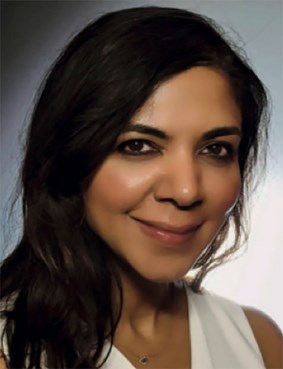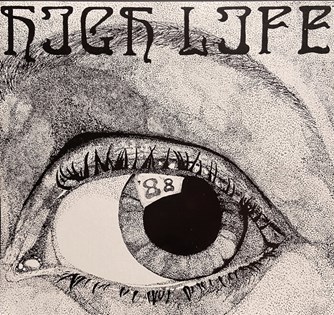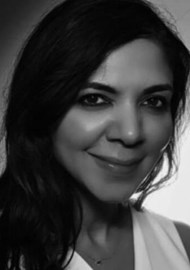
We were delighted to catch up with Rachna Murthy, renowned Oculoplastic Surgeon, about her career and plans for the future.

You are internationally recognised in the field of oculoplastic surgery – what led you into this specialty?
Eyes are arresting – nothing in medical school was as beautiful and intriguing as the eye. But even as a teenager I spent time sketching eyes, documenting what I observed, the emotions, the beauty. For our final year high school magazine cover I drew an eye (see figure 1 below). And now, as an Oculoplastic Surgeon, I am still studying the eye and eyelids, what emotions they convey, how to restore them after cancer or how to rejuvenate them as we inevitably age. What I still find fascinating is that a change in lid position of just a millimetre can convey fear, or tiredness, interest or boredom.

Figure 1.
Oculoplastics is a softer version of plastics - my plastic surgeon father was up all hours on-call and I knew that I wanted a specialty where I could sleep. There was also some rivalry between father and daughter: he was a gold medallist in his medical school, the highest scoring student of his batch. The only exam question he got wrong was in ophthalmology. He jokingly told me it was the hardest topic, and who knows whether subconsciously this spurred me to choose the topic?
We understand that your father was a burns surgeon – can you tell us a little bit about him and the influence he had on your own career?
My father moved with his young children and anaesthetist wife from India to the UK, when I was four. He went from dealing with local villagers requiring all types of surgery (including reconstructions following bear maulings) to the UK where he dealt with victims from the Falkland’s war. It wasn’t easy to settle into a new country but his mantra “follow your heart, take your brain with you, and always be kind” is hard to improve on.
What has been the best piece of advice that you have received professionally and what advice would you offer to those following in your footsteps?
We all wear multiple hats – mother, surgeon, academic, entrepreneur, wife, cook, daughter, chauffeur, sister. The key to happiness, as I understand it, is to remain connected to one’s community, to take the opportunity to laugh and to balance somewhat all the different roles we have. One cannot, particularly as a woman, expect to excel at all of these roles all at the same time – this will only lead to stress. But each role is part of our identity and must be revisited.
I have always dared to follow my dreams – I’ve trained in Australia, Chelsea and Moorfields and Cambridge. I’ve published in leading journals, started two companies and developed a cleanser suitable for the eye and periocular area (Purifeyes). This life is not a dress-rehearsal and it’s not about “waiting our turn”. Just go for it – whatever it is. Time is the most precious commodity, and work should allow us to have more time for ourselves and others.
Your field is evolving all the time; what do you think have been the most exciting developments in recent years?
I would say three things have been really exciting for me:
Advances in technology and molecular biology are now allowing us to perform rapid facelifts without surgery. We have also seen new drugs developed to treat squamous cell carcinoma and basal cell carcinoma which previously would have been inoperable. Unfortunately, these are not yet available on the NHS. We have developed a better understanding of the pathogenesis, triggers, drives and treatments for thyroid eye disease, and oculoplastics – and medicine as a whole – is developing a more holistic way of managing patients and focusing on their quality of life.
How has the COVID-19 pandemic impacted your professional life over the last year?
I’ve never been more proud to be a doctor but at times it has been terrifying. My husband is an anaesthetist on the frontline intubating team. COVID has also shown that when circumstances change we find smarter ways of working and I think some of the innovations are here to stay.
If you could recommend just one textbook or journal paper to your colleagues what would it be?
The last two years have been really productive for my team and our work on thyroid eye disease has become internationally recognised, and particularly how to combine TED care with aesthetic treatments to benefit patients physically and psychologically. This work is being incorporated into the upcoming ESOPRS Oculoplastics Textbook being produced by Springer, edited by UK, Italian and Dutch friends and colleagues, and with contributions from Europe’s leading oculoplastic surgeons. So, I would recommend that one.
Where do you hope your career will take you in the next 10 years?
I’ve now spent over 20 years in the NHS and have decided to take my career in a new direction. I have given up my income and pension to launch three new ventures – my clinic in Harley Street and Cambridge (www.facerestoration.com), my training course (www.aesthetics-course.com) and our first – but not last – product, Purifeyes (www.purifeyes.co.uk). This is exciting and will occupy me for the next decade.
And finally, if you have any spare time how do you like to relax?
We all have things we could do better and particularly with COVID I feel like I have not really relaxed for years. I am trying to keep lots of plates spinning. But I do own a free-standing copper bathtub and after riding my peloton bike slipping into it feels divine. Many thanks for your time!




